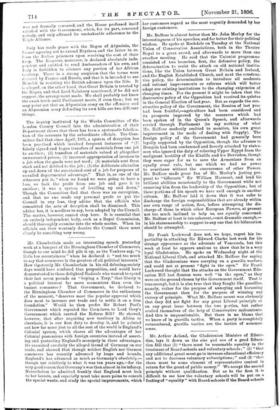Mr. Balfour is almost better than Mr. John Morley for
the interestingness of his speeches, and far better for their political wisdom. He spoke at Rochdale on Tuesday at the National Union of Conservative Associations, both in the Theatre Royal to a great crowd, and afterwards to more than one overflow meeting. He said that the Unionist programme consisted of two branches, first., the defensive policy, the determination to resist the attack on old national institu- tions, like the Union between Great Britain and Ireland, and the English Established Church, and next the construc- tive policy, the determination to introduce all moderate and rational improvements or reforms which will better adapt our existing institutions to the changing exigencies of changing times. For the present it might be taken that the destructive policy of the Opposition had received its quietus in the General Election of last year. But as regards the con- structive policy of the Government, the Session of last year had been fruitful,—agriculture had been considered and its prospects improved by the measures which bad been spoken of in the Queen's Speech, and afterwards carried through Parliament (to say nothing of what Mr. Balfour modestly omitted to mention, his own great improvement in the mode of dealing with Supply). The foreign policy of the Government had generally been loyally supported by the Opposition, though the advance to Dongola had been condemned and fiercely attacked by states- men who ignored the duty of relieving Upper Egypt from the malignant hostility of the Khalifa and his Dervishes, though they were eager for us to save the Armenians from an equally cruel rule, but one which we had no power to overthrow without the concurrence of other Powers. Mr. Balfour made great fan of Mr. Morley's jesting pro- posal to " bifurcate " Sir William Harcourt, and lend his brilliant abilities occasionally to the Government while not removing him from the leadership of the Opposition; but of these portions of his speech we have said enough in another column. Mr. Balfour laid it down that it was safer to discharge the foreign responsibilities that are already within our own range of action, first, before attempting the dis- charge of those in which other European Powers, at present not too much inclined to help us, are equally concerned- Mr. Balfour at least is too coherent,—not dramatic enough,— in his statesmanship to suggest to any one that his bifurcation should be attempted.






















































 Previous page
Previous page